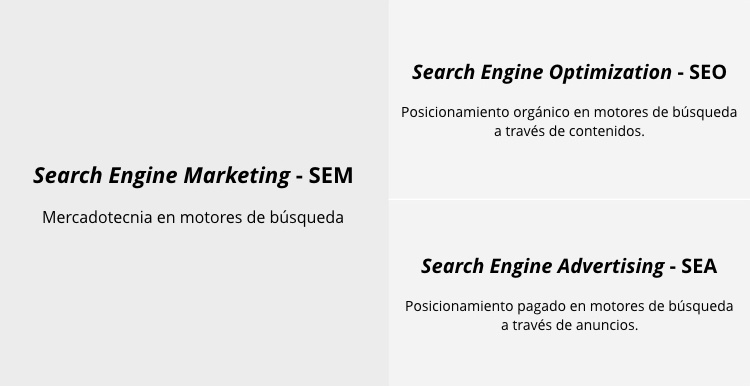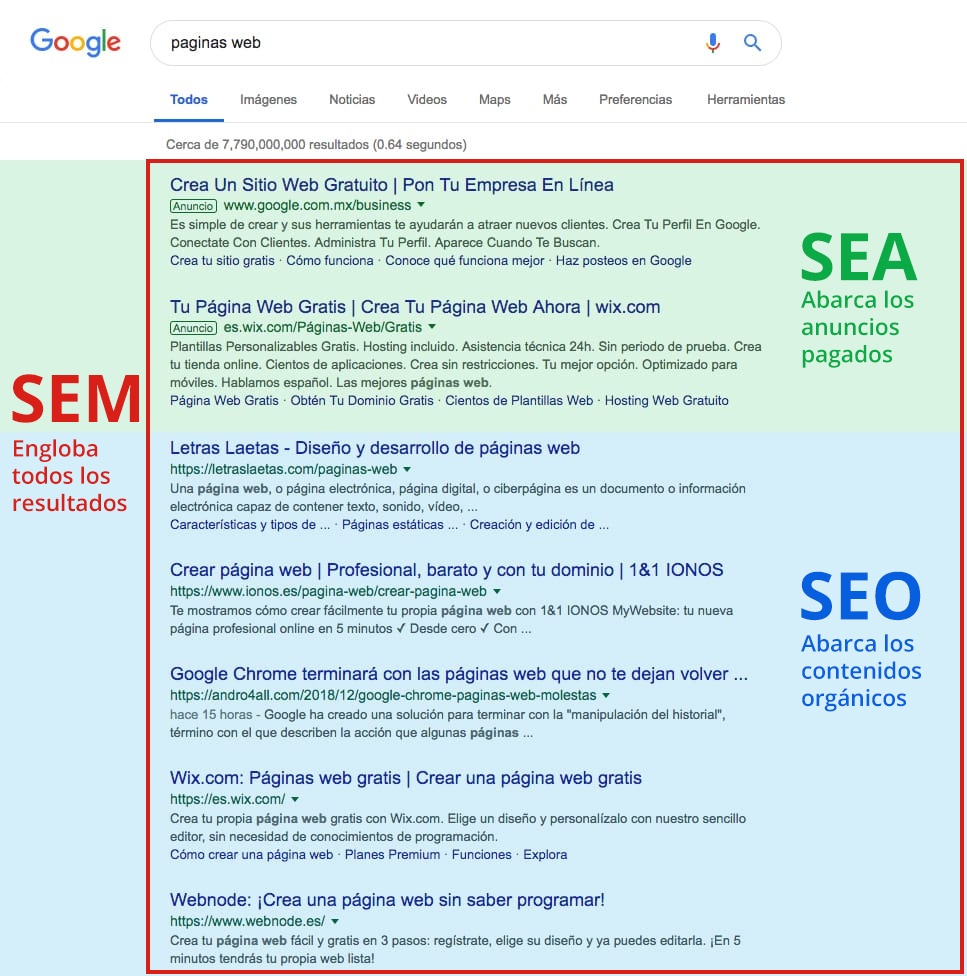Many clients ask me how to appear at the top of search engines when a user makes a query related to their products or services; for this there are two complementary methods, one faster than the other: Search Engine Advertising (SEA) and Search Engine Optimization (SEO). Both SEO and SEA are part of what is known as Search Engine Marketing (SEM). In this post I tell you what their main differences are.z

SEO consists of creating content and applying a series of techniques to organically appear in the top positions, when a user makes a query through an Internet search engine. By organic I mean that it is without paying for ads and by content I mean all text (like blog posts), image (photos, infographics, gifs, etc.), video or audio (like podcasts) that Internet users found through the web.
For its part, the SEA consists of creating ads to appear with certain keywords or keywords. For example, a web query for the keyword ‘web pages’. The SEA results are shown in green and the SEO results in blue.

Search Engine Marketing (SEM), important terminological questions
Before moving forward, it is important to point out that until a few years ago the term SEM was used to designate the SEA. However, with the emergence of new services related to both Internet and social network search engines, it was decided to make a distinction in which SEM was a broader concept, encompassing both SEO and SEA. It is very likely that in articles prior to 2020 you will find that the term SEM or Search Engine Marketing is used to designate what is known today as SEA. On the other hand, in this post I only talk about the positioning in search engines of the web in general, but there is a technique called SMO or Social Media Optimization, which consists of improving the visibility of a site on social media. Some authors include this technique within the SEM, as carrying it out is an activity that concerns search engine marketing.
Search Engine Advertising (SEA)
Traditionally, SEA had consisted of paying for advertising through the Ads platforms of search engines like Google, Yahoo and Bing. Now you can also pay for advertising on other search engines like Amazon, YouTube, Google Play and the AppStore. To do this, you select a list of keywords with which your potential customers search for your products or services. You can select from several ad formats, and you can also segment your audience by location, age, gender, parental status (for video and display campaigns only), and household income.
Search Engine Optimization (SEO)
For its part, SEO consists of a series of techniques related to:
a) Technical aspects of your website: such as the configuration of some files called sitemap.xml, robots.txt and the correct placement of metatags, among others.
b) The content of your website: The more quality content you offer to your audience, the search engines will consider it more relevant and you will have a better position.
c) The links that point to your website: If the contents of your site have a good quality, it is likely that they will be shared on social networks or that other users will link to your page. Search engines use the number of links to your site as a criterion to determine how relevant it is; the higher the relevance, the better positions in the SERP (Search Engine Results Page) or the highly competitive first page of the browser.
What is better, SEO or SEA?
As I mentioned above, it is about two complementary methods; however it also depends on your timing. SEA is faster than SEO, because just by starting to pay for advertising you will appear in the top positions with the terms you have selected. On the other hand, if we see it as a long-term strategy, complementing these results with SEO can help you reduce costs and enjoy greater credibility among users. In other words, if one of your keywords is ‘psychology degrees in the cdmx’ and you are paying $25 each time a user clicks on your ad, why not save this amount by positioning that term organically? In the long run, coordinating your SEO and SEA efforts correctly increases the performance of your campaigns.
If you want to know more about digital marketing, ¡follow us on Twitter or contact us for a consultancy!!
Note: Given the terminological changes mentioned above, this note was updated on January 31, 2021.


